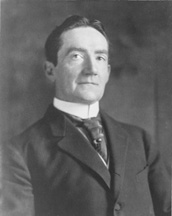Jonathan Bourne
Jonathan Bourne Jr. (born February 23, 1855 in New Bedford , Massachusetts , † September 1, 1940 in Washington, DC ) was an American politician ( Republican Party ) who represented the state of Oregon in the US Senate .
Early years
Originally from Massachusetts, Jonathan Bourne was taught at private schools before enrolling at Harvard University , where he remained from 1875 to 1877. In 1877 he made a trip to Asia, which ended with a shipwreck off the island of Formosa . After his rescue, he returned to the United States and settled in Portland , the capital of Oregon, in 1878 . There he studied law and was admitted to the bar in 1881, after which he practiced as a lawyer in Portland until 1886. He also worked as a businessman in mining, cotton growing and trading.
Political career
Bourne's political career began with membership in the Oregon House of Representatives , where he represented the interests of Multnomah County from 1885 to 1886 . In 1897 he entered the state parliament again for a one-year term. On November 6, 1906, he stood for the Republicans in the election to the US Senate. He applied for the mandate for the legislative period beginning March 4, 1907; at the same time the successor to the deceased in December 1905 Senator John H. Mitchell was elected, whose place the Democrat John M. Gearin had taken provisionally since then . Neither Bourne nor Gearin ran in this election for the remainder of Mitchell's brief term; this was decided by Frederick W. Mulkey , who then only spent a little more than five weeks in Congress . He then resigned his seat to Bourne, who had defeated Gearin with 46.2 percent of the vote. These two elections were the first after the Oregon Parliament passed a Direct Primary Law . Accordingly, it was now up to the citizens to determine the candidate who then only had to be officially elected to office by the Oregon Legislative Assembly . In all other states, the election of senators was at that time the sole matter of the state parliaments; this only changed in 1914, when the 17th amendment came into force.
Bourne served a full six-year term in the Senate. During this time he was, among other things, chairman of the Fisheries Committee and a member of the Postal Committee. In his party he belonged to the progressive wing and served, among other things, as president of the National Republican Progressive League . Accordingly, he was a leading member of a group that wanted President Theodore Roosevelt to run for a second term of his own in 1908 . However, this waived in favor of the more conservative William Howard Taft .
In 1912 Bourne lost his party's primary to Ben Selling. However, he still ran as an independent candidate in the Senate election and took third place with 19.4 percent of the votes. The split in the Republican electorate that arose in this way meant that the Democrat Harry Lane, with a share of 30 percent, won over Selling (28.8 percent) and was able to replace Bourne as Senator on March 3, 1913.
After retiring from Congress, Jonathan Bourne returned to business in Oregon and Massachusetts. He also got into the newspaper business in the federal capital Washington, where he died in September 1940. The Cracker City parish in northeast Oregon has been renamed Bourne in his honor .
Web links
- Jonathan Bourne in the Biographical Directory of the United States Congress (English)
- Jonathan Bourne in the database of Find a Grave (English)
| personal data | |
|---|---|
| SURNAME | Bourne, Jonathan |
| BRIEF DESCRIPTION | American politician |
| DATE OF BIRTH | February 23, 1855 |
| PLACE OF BIRTH | New Bedford , Massachusetts |
| DATE OF DEATH | September 1, 1940 |
| Place of death | Washington, DC |

